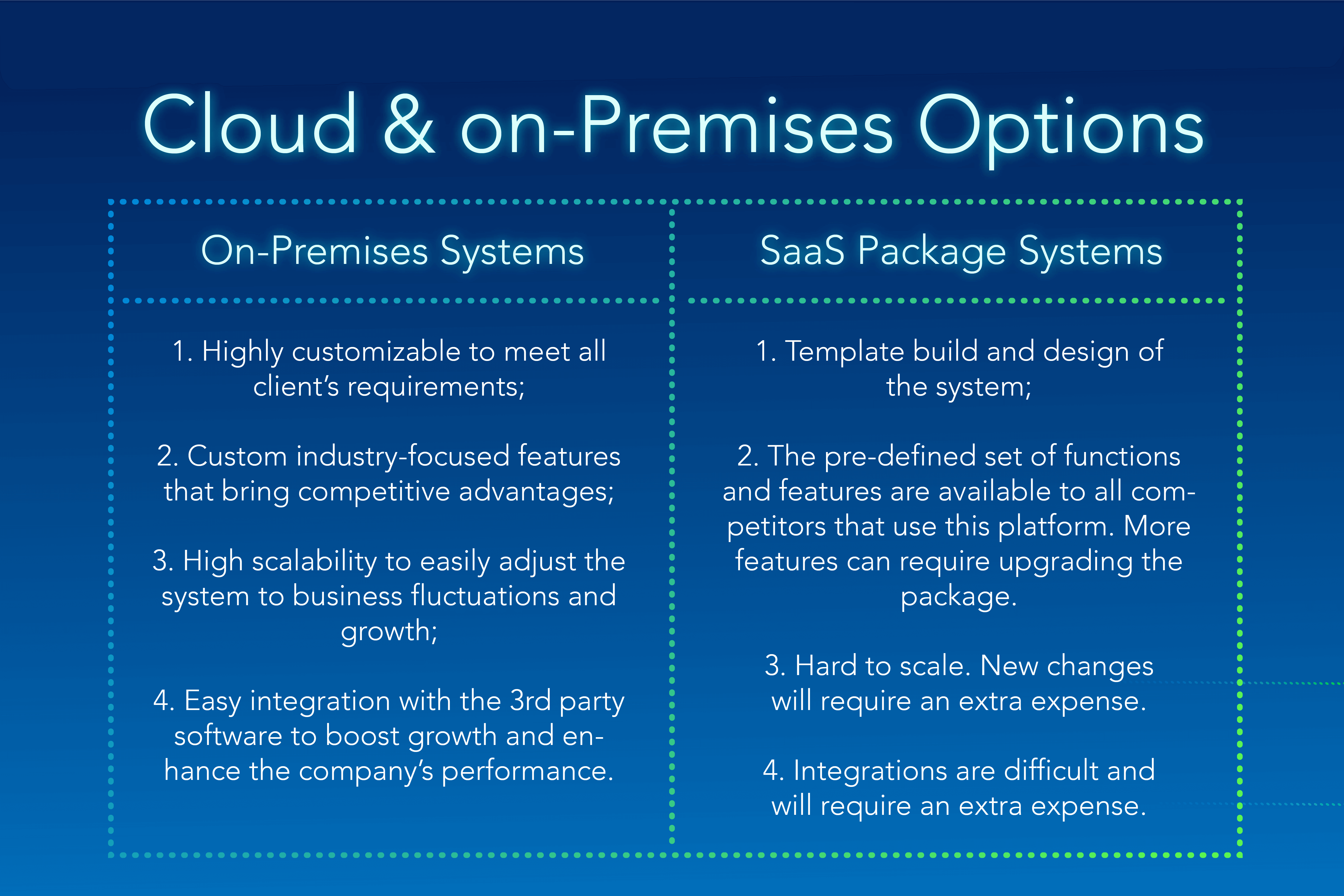Our customers often ask: “Do you have an out-of-the-box (off-the-shelf) solution for us? A ready-made software?” We explain that we create custom software and mention the following example:
There are many website templates using which you can create a simple website within a day! Nevertheless, most businesses still choose custom ( long and more expensive) website development that meets their requirements. And they have unique, more attractive, and more relevant websites in the end.
Ready-made templates or SaaS may be an option for startups as they do not require many functions and customization. But do you think it is possible to grow with a template that gets outdated within a year or two? Growth is the key. If a business wants to grow, it must use software that will not hinder this growth and will even stimulate it.
When it comes to building high-load complex systems, web and mobile apps, and websites, businesses should know all pros and cons of custom vs SaaS software. Here are 10 reasons why our customers choose to develop a unique tailored-made system or app instead of choosing a SaaS:
Security

Custom development gives companies a convincing level of privacy and security. Despite pricing and possible issues, the main point is that with сustom software development, it is possible to ensure the safety of any system to the maximum. State institutions, healthcare bodies, and financial businesses possess classified and sensitive information vital for their success. They demand security guarantees from the IT sector. And only custom developers can offer this as they have quality policies, pass security audits, and can develop systems according to the specific requirements of each client.
According to Forbes, security remains their #1 concern for any CTO. And the number of risks is rising because of remote work.
Cloud solutions can offer many seductive options for companies, but security is not one of them. Apparently, if a criminal mind has intentions to break through a security shield, it can do it much easier on the cloud than on-premises. Broken logins, loss of intellectual property, and disclosed private information on the cloud do not sound convincing.
Time
Time constraints often matter for companies. Custom systems have a reputation for being more time-consuming than out-of-the-box solutions, but that is a relative advantage. Template solutions can be offered to a client within a day. But their customization can take considerable time.
Usually, special software and websites of the companies need to meet more specific requirements than it may seem at first glance.
- Each industry differs and needs specific features in its software;
- To pursue business goals, companies use different types of software. These can be specific industry-focused work environments, etc.;
- The world changes, and the solutions have to change with it. Changes can affect the market, competition, the company itself, processes, and regulations.
If the company is going to change the software, it will need different volumes of customization, and on-premises development is often better. In the end, this will take less time than migrating the site to a more customizable platform or other manipulations.
If the company does not plan to interfere much with the system, a SaaS template site can be a better choice in terms of time for development. It is up to the company to weigh the pros and cons of template and custom solutions and make the decision.
Staff Training
After the solution is ready, custom developers conduct training for the personnel of the client. They explain how to use the system, how to make system settings, how to use features to hit business objectives, how to combine different features in the most beneficial way, what is mandatory for the system, and what is recommended.
Systems that achieve considerable results are often complicated. Companies that offer custom software need highly qualified specialists to make technical design, code, test, and management. They select IT personnel and adapt them to their teams to work on their projects and make sure that the solutions meet all requirements.
On the other hand, SaaS providers with package solutions do not train clients’ personnel. It is supposed to be clear to the customer. If the client is lost, it can refer to support or help platforms.
Also, while maintaining their platforms, SaaS providers tend not to hire and train additional personnel. They can outsource tasks or projects to remote contractors due to the remote nature of out-of-the-box solutions, which makes it possible. SaaS companies and their contractors can make service agreements. The form of collaboration among them can vary. But this means that the company that bought a package and used a SaaS platform can expose its data to other parties.
Scalability
On-premises tools can be scalable and grow along with the businesses. On the contrary, SaaS template systems do not have much scalability. This means that with the growing changes in the company, these systems will not be able to catch up. In a while, management will have to order new solutions to solve its growing demands.
The goal of any business is to grow. So how can you buy software that is limited by default?
Usually, all processes in a company are interdependent, and these new solutions probably will need to have a connection with the old ones to attain goals faster. It is up to the company how to plan the work of its IT tools. But scalability is a factor that specialists recommend for growth.
Special Features
When an entity orders on-premises tools specific to its industry, it can know that this system will be unique in all senses. First of all, it will have unique strategic features that give the entity benefits. This is one of the main reasons why entities make tools on order. For example, entities that work in finance, market research, and online promotion need specialized systems to compete.
Custom software will be built for a specific business logic, specific tasks of your company and your people. For instance, off the shelf LMS system can be a good solution if you need it fast. But what if your company wants to make specific reports or works with specific types of training?

Specialized SaaS platforms also offer features specific to industries. But they offer them to all their users. This means that with specialized SaaS platforms, an individual company will have the same features as other entities in this field. And this company will not win from a functional viewpoint. This makes entities choose custom websites and solutions over SaaS packages.
Integrations
When companies plan the development of their systems, they endeavor to do it with their growth plan in mind. Saas platforms can support some software for integration or not. If they do, they often offer this list. The companies can be offered to pay extra for the integration that they need, switch to another package, and proceed with their work.
But the pre-defined and often not long list of integration limits the companies’ movement and freedom of choice. In case the business environment changes, and there are better or different business options, companies will stay with the earlier option. With the on-premises software, there are no limitations for companies to make almost any integration. That is why many big companies and the ones that intend to grow rapidly and stay flexible prefer custom development.
Cloud & On-Premises Options

Company Compliance
Many companies have to work under strict regulations and keep to a long list of standards in their digital operations. Healthcare entities cannot disclose the health information of their clients (HIPAA, FHIR), financial institutions have to protect information about their accounts, educational establishments must keep private the disciplinary reports that they give to students (FERPA), and many more. There is only one way for the entities to comply. This is a system made on-demand with on-premises databases and stable, enduring security. Otherwise, they are subjected to eventual attacks, data loss, and fines.
SaaS solutions will not guarantee that their template sites, cloud storages, processes, and security can adhere to dozens of regulations and standards for different industries. That is why they are not recommended for companies that work under regulations for digital information.

Emergency Situations and Control
When building a custom solution, a business can choose to store data anywhere it is required. All data, operations with data, metadata, and historical data are kept on-premises or in the cloud. Companies can digitally and physically control it. If the companies possess the resource, they have full control over it. It also means that they bear responsibility for everything that happens to this resource. Companies that build custom software have recovery and emergency plans and know how to act in any situation.
If there is downtime or in the event of a disaster, companies who are using a SaaS solution may not have access to their data.
Purchase of the License
Many companies choose to buy the license. In case they own the resource, they are completely in charge of this tool and can change the IT teams. They can further develop it in any way that they consider beneficial. This is not an option when companies use SaaS sites on a package basis. Here, the provider is in charge of the resource, and the company is temporarily using it. Both options have their pros and cons, and each individual company can choose what is a good option for it in the current situation.
Key Takeaways
Systems made on-demand have been and still remain popular, with the business showing positive market growth. The primary consumers of these tools are big corporations and public authorities, but businesses that want to grow should also invest in custom systems. Though it may seem more time-consuming, in the end, it will be cheaper than changing or upgrading a SaaS on the go.







